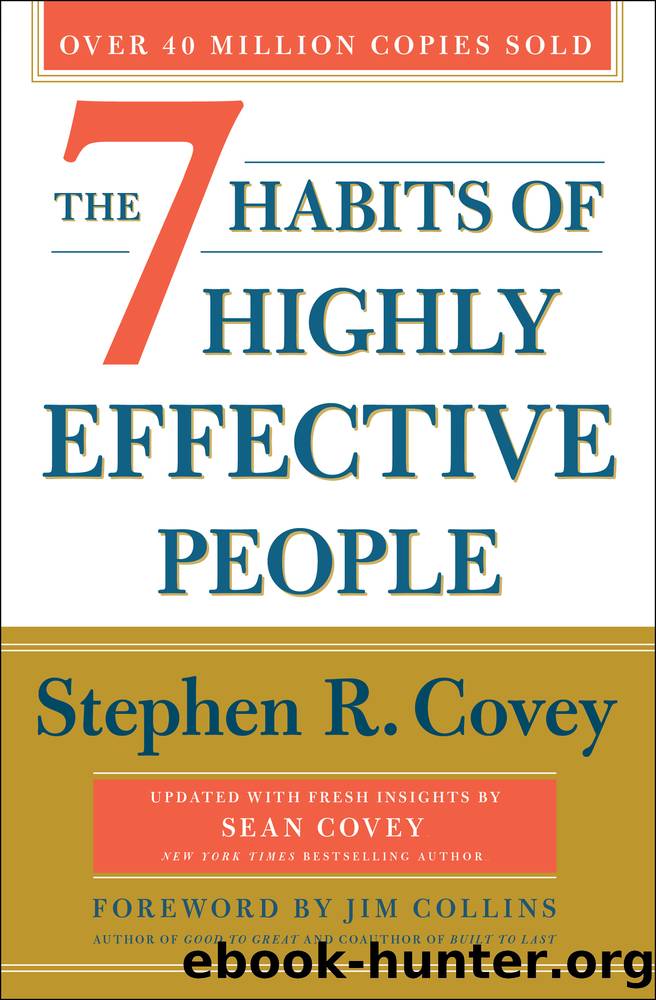The 7 Habits of Highly Effective People by Stephen R. Covey & Sean Covey

Author:Stephen R. Covey & Sean Covey
Language: eng
Format: epub
Publisher: Simon & Schuster
Published: 2020-05-19T00:00:00+00:00
Showing Personal Integrity
Personal integrity generates trust and is the basis of many different kinds of deposits.
Lack of integrity can undermine almost any other effort to create high trust accounts. People can seek to understand, remember the little things, keep their promises, clarify and fulfill expectations, and still fail to build reserves of trust if they are inwardly duplicitous.
Integrity includes but goes beyond honesty. Honesty is telling the truthâin other words, conforming our words to reality. Integrity is conforming reality to our wordsâin other words, keeping promises and fulfilling expectations. This requires an integrated character, a oneness, primarily with self but also with life.
One of the most important ways to manifest integrity is to be loyal to those who are not present. In doing so, we build the trust of those who are present. When you defend those who are absent, you retain the trust of those present.
Suppose you and I were talking alone, and we were criticizing our supervisor in a way that we would not dare to do if he were present. Now, what will happen when you and I have a falling-out? You know Iâm going to be discussing your weaknesses with someone else. Thatâs what you and I did behind our supervisorâs back. You know my nature. Iâll sweet-talk you to your face and bad-mouth you behind your back. Youâve seen me do it.
Thatâs the essence of duplicity. Does that build a reserve of trust in my account with you?
On the other hand, suppose you were to start criticizing our supervisor and I basically told you I agree with the content of some of the criticism and suggest that the two of us go directly to him and make an effective presentation on how things might be improved. Then what would you know I would do if someone were to criticize you to me behind your back?
For another example, suppose in my effort to build a relationship with you, I told you something someone else had shared with me in confidence. âI really shouldnât tell you this,â I might say, âbut since youâre my friendâ¦â Would my betraying another person build my trust account with you? Or would you wonder if the things you had told me in confidence were being shared with others?
Such duplicity might appear to be making a deposit with the person youâre with, but it is actually a withdrawal because you communicate your own lack of integrity. You may get the golden egg of temporary pleasure from putting someone down or sharing privileged information, but youâre strangling the goose, weakening the relationship that provides enduring pleasure in association.
Integrity in an interdependent reality is simply this: you treat everyone by the same set of principles. As you do, people will come to trust you. They may not at first appreciate the honest confrontational experiences such integrity might generate. Confrontation takes considerable courage, and many people would prefer to take the course of least resistance, belittling and criticizing, betraying confidences, or participating in gossip about others behind their backs.
Download
This site does not store any files on its server. We only index and link to content provided by other sites. Please contact the content providers to delete copyright contents if any and email us, we'll remove relevant links or contents immediately.
The Bullet Journal Method by Ryder Carroll(1510)
Doesn't Hurt to Ask by Trey Gowdy(1400)
The Concise Laws of Human Nature by Robert Greene(1223)
The 7 Habits of Highly Effective People by Stephen R. Covey & Sean Covey(1014)
HBR's 10 Must Reads 2021 by unknow(976)
Hook Point: How to Stand Out in a 3-Second World by Brendan Kane(934)
HBR's 10 Must Reads 2021 by Harvard Business Review(878)
The Job Closer by Steve Dalton(829)
Don't Sweat the Small Stuff...and It's All Small Stuff by Richard Carlson(810)
Master of One by Jordan Raynor(809)
100 Things Successful People Do by Nigel Cumberland(800)
Primal Leadership by Daniel Goleman(781)
Amazon Unbound by Brad Stone(779)
Declutter Your Mind: A step by step guide to learn to control your thoughts, stop worrying, relieve anxiety and eliminate panic attacks and negative thinking by Mia Chandler(748)
Lives of the Stoics by Ryan Holiday & Stephen Hanselman(723)
Coders at Work: Reflections on the craft of programming by Peter Seibel(660)
The Power of 100! by Shaun King(645)
Conflicted by Ian Leslie(644)
The Mechanism of Mind by Edward De Bono(639)
